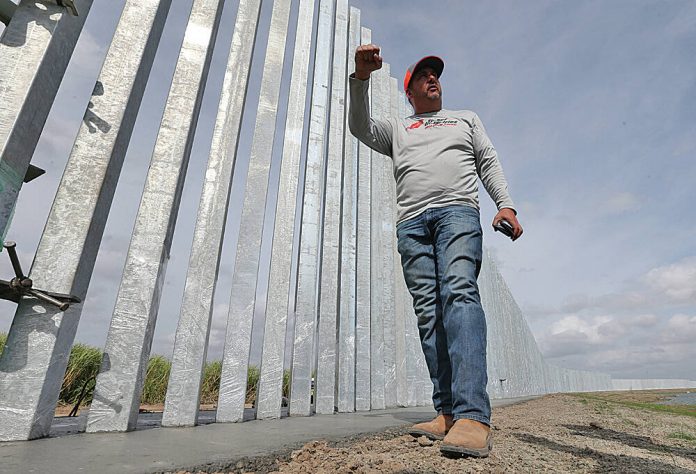
|
Only have a minute? Listen instead
Getting your Trinity Audio player ready...
|
The federal government has announced it has reached a settlement with the builders of a 3-mile stretch of private border wall along the banks of the Rio Grande south of Mission.
The news came Thursday, when attorneys representing the International Boundary and Water Commission filed a document announcing they had come to terms with the wall builders in the two-year-old lawsuit.
“(T)he parties have resolved the remaining issues and have agreed to a settlement of this case,” the document reads.
“Additionally, approvals from the appropriate federal officials have been obtained,” it further reads.
The exact terms of the settlement — as well as if those terms will be made public — remains unknown, though the parties are expected to file a joint motion to dismiss the lawsuit by May 27.
The lawsuit began in December 2019, when federal prosecutors, on behalf of the IBWC, sued North Dakota construction tycoon Tommy Fisher and his companies; local landowners Neuhaus and Sons; and Iraq War veteran Brian Kolfage and his fundraising nonprofit, We Build the Wall.
The government claimed the structure, which was then under construction, would put the United States in violation of a 1970 international boundary treaty with Mexico because it could potentially cause a change in the flow or course of the Rio Grande.
The federal lawsuit came just days after the National Butterfly Center, and its executive director, Marianna Treviño Wright, sued the same group of defendants in state court.
The center claimed that the wall, which was being built on property adjacent to its own, caused a prospective nuisance that could infringe upon the center’s property rights.
The center further alleged that the defendants had collectively defamed Treviño Wright through social media posts in which Kolfage falsely accused the executive director of participating in child sex trafficking.
However, the government dropped Kolfage and his nonprofit from its lawsuit after their attorney, former Kansas Secretary of State Kris Kobach, testified that We Build the Wall’s financial contributions to the project had amounted to a small fraction of the total cost — just $1.5 million of its $40 million price tag.
The government also dropped Neuhaus and Sons from the litigation once the transfer of ownership to Fisher was finalized — more than a year into the litigation.
And in a report published last April, engineers and hydrologists with the IBWC officially concluded that the now-complete bollard fence did pose treaty violations.
That was due in part to flood modeling data that showed that at least one section of the structure would cause significant enough water deflection to violate the standards of the treaty.
The IBWC officials also shared concerns over the site’s long-term maintenance plans, the lack of access points for federal law enforcement agents, and that the structure’s extremely close proximity to the riverbank could cause it to catch debris during a flood, thereby exacerbating flood conditions.
But throughout the litigation, the government’s attorneys seemed eager to reach a compromise with Fisher — one in which the charismatic construction CEO could make alterations to the structure that would be significant enough to mitigate whatever treaty concerns the government had.
And it appears that those negotiations have at last succeeded.
Meanwhile, though the government’s case against Fisher is approaching the finish line, that is not the case in the butterfly center’s lawsuit.
After remaining entangled with the government’s case in federal court for more than two years while the judge delayed making a decision over jurisdiction, the center now finds its lawsuit back where it began — in state court.
In January, U.S. District Judge Randy Crane finally issued a much-delayed order as to whether or not he had jurisdiction to hear the case.
In his ruling, the judge said he was retaining jurisdiction over the property rights aspects of the butterfly center’s lawsuit, while remanding their defamation claims back down to the state court where the lawsuit was originally filed.
Feeling that the decision was a deliberate attempt to kill its claims, the butterfly center chose to drop the portion of its lawsuit which had remained in federal court.
“We are doing this because Judge (Randy) Crane has made clear his intention to dismiss our lawsuit and we cannot risk him doing that with prejudice for any or current future claims,” Treviño Wright said then.
Furthermore, though the government had dropped Kolfage and We Build the Wall from its suit, they remain defendants in the butterfly center’s suit.
Just last month, Kolfage and another man, Andrew Badolato, pleaded guilty in New York federal court to charges that they had used the nonprofit to defraud thousands of individual donors out of millions of dollars.
A third co-conspirator, Timothy Shea, is expected to go to trial later this year.
Also caught up in the fraud allegations was Steve Bannon, one of former President Donald Trump’s most trusted advisers. Trump issued Bannon a blanket pardon just hours before leaving office last January, thus ending Bannon’s risk in the New York criminal case.




